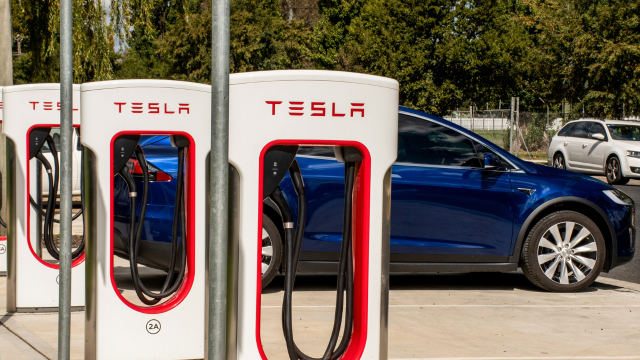Australia may be on track to get fuel efficiency standards, according to a speech Climate Change and Energy Minister Chris Bowen gave today at the EV Summit in Canberra.
In September, the Australian government will be releasing a discussion paper that will inform the development of a national electric vehicles strategy and the introduction of fuel efficiency standards, as announced by Bowen today.
Australia is the only country in the OECD that doesn’t have fuel efficiency standards (except for Russia). In terms of electric vehicle uptake, fuel efficiency standards are by far one of the most important elements to ensuring a healthy supply of electric vehicles are brought to and sold in a country.
Fuel efficiency standards are rules put in place on automakers to reduce the emissions used by the vehicle. They’re a cap placed on a fleet of cars, incentivising the development of more efficient vehicles and strictly regulating the emissions output of cars.
The struggle doesn’t end at simply having them, however, as they need to be strong standards, otherwise Australia may still get less fuel-efficient vehicles than other countries.
“While Australia doesn’t show leadership, manufacturers prioritise markets which do,” Bowen said in his speech.
“Consumers aren’t getting the choice available internationally and as the world moves towards more efficient and cleaner vehicles, we risk becoming a dumping ground for older technology which can’t be sold in other markets.”
The uptake of electric vehicles has been impacted by the chip shortage, a problem affecting all tech markets internationally, expected to continue for at least another several months.
But in Australia, while the chip shortage is one of the leading reasons for EV shortages, fuel efficiency standards are arguably more important.
“As everyday Australians feel the strain of the cost of living crisis, we’re hearing cries out for affordable EVs, which are cheaper to run and maintain than petrol vehicles. Today, the government is saying ‘we hear you’ and putting us firmly in the queue to secure a reliable supply of affordable EVs,” said Ajaya Haikerwal, a clean transport campaigner at Solar Citizens, an Australian renewable energy advocacy organisation.
Haikerwal considers this a “sensible policy”, one that would “finally let Australia show up to the EV race”.
“We know that manufacturers often overestimate the emissions savings of hybrids and plug-in hybrids, so although these vehicles are good for some amount of emissions reduction in the short term, we need a world-class standard with no loopholes for hybrids. No other country in the world includes credits for hybrids in its scheme,” he added.
Do keep in mind that fuel efficiency standards don’t necessarily apply to companies like Tesla and Polestar, which only sell electric vehicles.
Where fuel efficiency standards do come into play is when we consider larger manufacturers who prioritise petrol vehicle production.
Take Kia, for example, which is only bringing 500 EV6 cars to Australia this year, and still prioritises petrol vehicle sales here. There’s no incentive for Kia to sell more electric vehicles because there’s no ‘punishment’ for their accumulative vehicle fleet emissions.
If strong standards were to be introduced, vehicle manufacturers would likely bring more electric vehicles to Australia and would bring them to Australia sooner (with Australia usually getting new EVs years after their debut in other countries). Manufacturers would also be incentivised to bring cheaper EVs to Australia to balance out their fleet C02 emissions.
“Passenger cars make up almost 10 per cent of Australia’s CO2 emissions. Serious action on climate involves serious action on transport emissions,” Bowen added.
“Naysayers point to the expense of electric vehicles – out of the reach of ordinary families – as a reason not to drive further uptake.
“And to an extent, they have a point. There are many consumers who would be interested in buying an EV – but even if they could access the limited stock available, price sends them to petrol or diesel models.”
You can probably tell that I’m an advocate for fuel efficiency standards by my writing. Personally, I don’t want to see the world burn.
While you’re here, why not check out our list of every new EV in Australia, or every electric vehicle coming to Australia.
